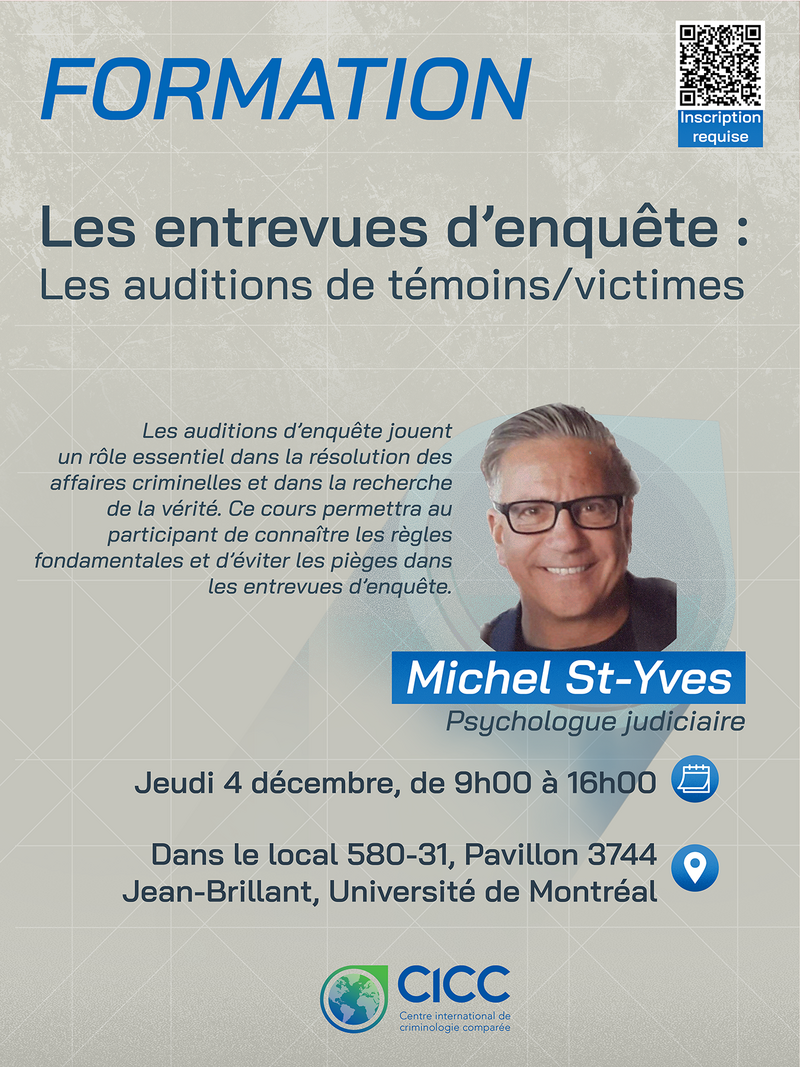
This paid training session will be led by forensic psychologist Michel St-Yves and will take place on Thursday, December 4, 2025, from 9:00 a.m. to 4:00 p.m. (doors open at 8:30 a.m.), in Room 580-31, Pavillon 3744 Jean-Brillant, Université de Montréal.
Investigative interviews play a crucial role in solving criminal cases and uncovering the truth.
This course will enable participants to understand the fundamental principles of effective investigative interviewing and avoid common pitfalls.
It will also introduce participants to new, evidence-based interviewing methods—commonly referred to as best practices—for conducting effective interviews with witnesses and victims.
DAY 1 – INTERVIEWING WITNESSES AND VICTIMS

Michel St-Yves, forensic psychologist, worked for ten years with the Correctional Service of Canada, focusing primarily on the criminal risk assessment of newly convicted offenders.
He then served for 26 years with the Sûreté du Québec in a specialized behavioral sciences unit supporting criminal investigations, assisting in offender profiling and police interview preparation.
He has also acted as an advisor to commanding officers and negotiators during crisis situations (Opérations Filet).
Dr. St-Yves teaches crisis intervention and investigative interviewing psychology at the École nationale de police du Québec, the Swiss Police Institute, and as a lecturer at the Université de Montréal’s School of Criminology.
His teaching experience extends across North America, Europe, North Africa, the Middle East, and Asia.
He has also contributed to missions with the United Nations, the International Committee of the Red Cross (ICRC), and the Max Planck Foundation, and helped establish the first continuing education program on investigative interviewing in Switzerland, where he has been an instructor since 2007.
Dr. St-Yves has been an invited lecturer at the École nationale de la magistrature (Bordeaux) and a scientific correspondent for the Behavioral Sciences Department of the French Gendarmerie.
He currently chairs the Cercle des psychologues francophones de la police, co-chairs the Scientific Committee of the International Investigative Interviewing Research Group (iIIRG), and contributes to the FBI’s High-Value Detainee Interrogation Group (HIG), which develops best practices in investigative interviewing.
His publications focus on the psychology of criminal investigations, crisis negotiation, and police interrogation.
He is the author or co-author of several books, including L’interrogatoire : d’un art à une science (2024), Les entrevues d’enquête : l’essentiel (2014), Psychologie de l’intervention policière en situation de crise (2011), Psychologie de l’enquête criminelle : la recherche de la vérité (2007), and Psychologie des entrevues d’enquête : de la recherche à la pratique (2004), all published by Éditions Yvon Blais.
Attention - Votre version d'Internet Explorer est vieille de 20 ans et peut ne pas vous offrir une expérience optimale sur le site du CICC. Veuillez mettre à jour votre ordinateur pour une expérience optimale. Nous vous recommandons Firefox ou Chrome, ou encore ChromeFrame si vous êtes dans un environnement corporatif ou académique dans lequel vous ne pouvez pas mettre à jour Internet Explorer.